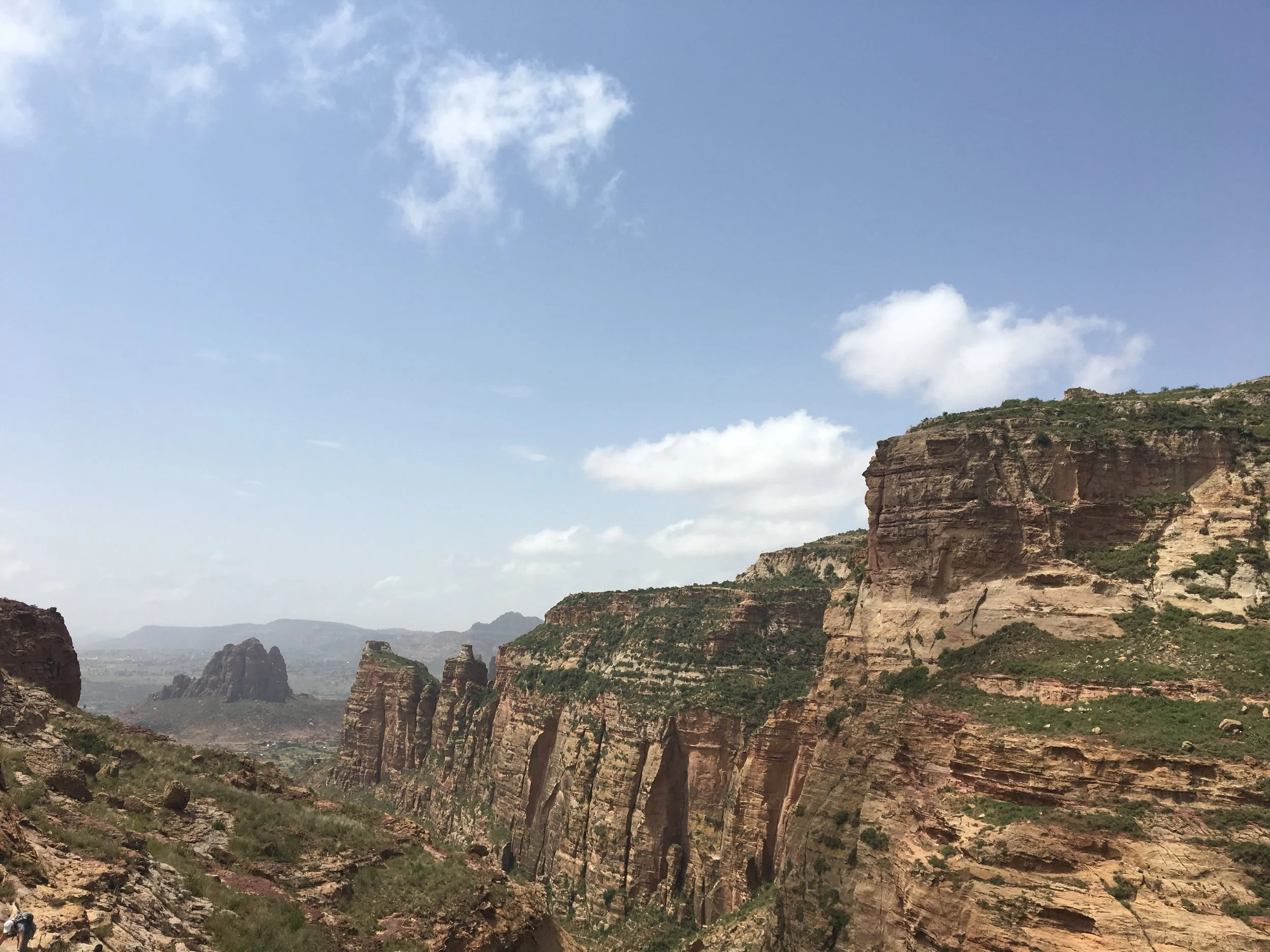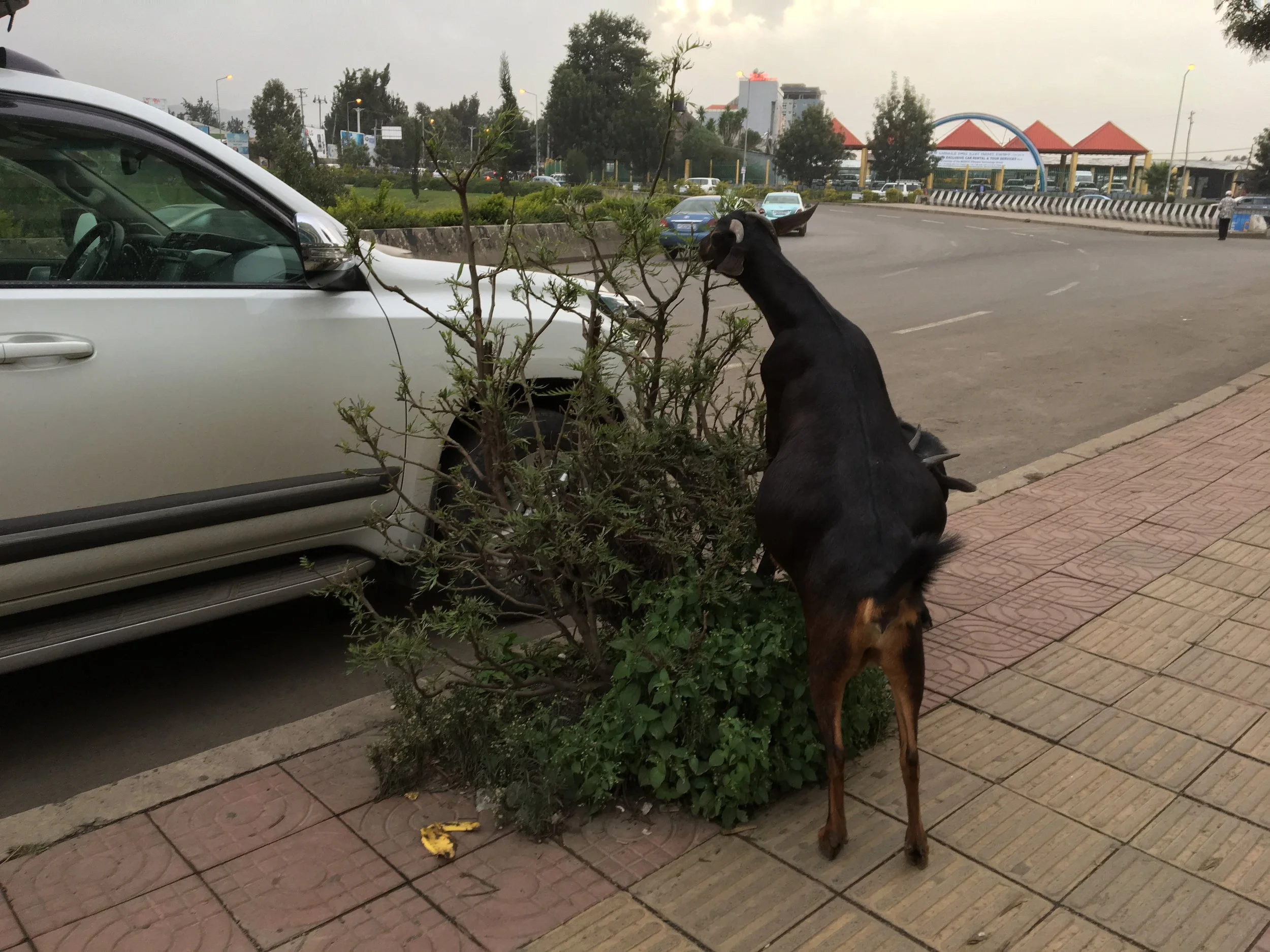The Eighth Month—Miyazia/April
Autumn. Light rains. As the soil softens ploughing begins, especially after Lent. Peasants trade for new iron plough points. Prices of meat, grain, pepper, double in preparations for the end of fasting. Second big wedding season after Easter. —The Wife’s Tale
Snippets
I’m trying to be better—to try again, to fail again, to fail better. (Thanks Sam Beckett) I returned to a friend, Hiwot, and was welcomed into her home even though it had been months. I was amazed that they looked past that and welcomed me and of course insisted I eat. Hiwot’s mom had a baby. I felt both grateful and embarrassed, but it was good to try again.
I was invited into the home of the man who runs one of the health clinics here. His wife made the best buna I’ve had it was nutty and spice, like cinnamon and chocolate.
I went to the mourning for a math teacher’s father and was fed three times in the span of three hours. I spent time with my female colleagues while they made a huge pot of buna for everyone; the sunlight catching the steam rising, a fire crackling underneath the pot charred black from previous burns. I’ve been to several mournings now and find that I like this tradition; its somber yet joyful.
Watched the upper class-man play football with my students—fun to just sit outside and observe.
A day
Went to school. Then, I went to the market where I sat and had a banana with the lady where I buy fruit, then sat and chatted with the lady who sells teff. Back to school to teach a tutorial for my students who are preparing for the mid term exams. Walked home and the kids were playing on my road so I joined them for a quick game of dodgeball (I consider this my workout for the day). Cooked dinner. Went to bed feeling complete.
Another day
Ran into my Bahraini friend’s husband who then of course invited me over for lunch. Asrat (their landlord) joined us and invited me over to his house for buna. I met his sister and his mother who is 105 years old! She is the sweetest, I sat with her as she chatted away, while Asrat’s sister served us buna with salt. Afterwards we sat outside. Asrat’s sister was weaving a basket, Asrat bought his mom and sister a soda, a malta for me, and a beer for himself. Later a man came to fix the clay plate used to make injera which had cracked in half. He expertly used metal wire and sutured the two pieces together, it was beautifully repaired.
Fasika
On Saturday I went to meet a student’s family having been invited to join them for Easter. Her older brother, Limano, picked me up at my house and we took a bajaj to Agamsedano, a nearby village. When we arrived on the seemingly empty dirt road we saw one of my other students and we walked around taking in the views of the surrounding mountains. My student invited me to his house so we went in and had the most delicious gomen (spinach) with fresh injera. His house was mud and un-plastered with woven mats on the floor. It was moving to see how humbly my students live and that they travel (a quick ride but at least a 1-2 hour walk) to get to school. Limano took me to his uncle’s house who gave us sugarcane to eat and then insisted I take an entire stalk with me.
Next door at Limano’s house I met his older siblings and parents, his younger sister, my student, greeted us. We ate misir wot (lentils) and drank buna, and then ate more sugar cane. As I got ready for bed I was sure I heard them killing the chickens to make doro wot, a traditionL Ethiopian dish, especially for holidays. I went to sleep sharing a bed with one of the little kids.
The next morning we went back to the Uncle’s house where we had doro wot. Limano’s grandmother kept feeding me bites of chicken wrapped in injera (this is part of Ethiopian culture, called gorsha, to show affection). Afterwards we had sugarcane and tella, a drink made from fermented barley. We returned to Limano’s house where we had buna and tea. Limano and I walked around the village and visited the primary school. We went back to his house for lunch—a second round of doro wot, this time served with hard boiled eggs, followed by sugarcane.
I returned to Kela and walked into Brike and Girma’s home with a stock of sugarcane taller then me and we all burst out laughing. I ate more doro wot with aib (cheese) and buna with milk, and beer! The next day we had sheep’s meat in a rosemary broth with kocho and injera. Then buna with milk and beer! It felt good to be included with more than one family—so full and content.
Everyday With(out) Geta
One of the hardest things this month was that Geta and his mom, Mimi, moved to Addis where Geta’s father lives. I’m sure they will visit and that I can see them when I’m next in Addis but I was crushed (and still am) to lose my best friend.
At the market some friend’s of Brike’s asked me if Mimi had left and I said yes. She looked at me, “and Geta?” Yes. She put her hand to her heart. Ayzosh. As if he were my own.
I keep thinking he’ll walk through the door with that quiet smile.
Geta and I were friends. We had a way where we didn’t have to talk to communicate and he was happy to quietly sit with me in my room while I worked. He helped me with everything. He was patient when I struggled to understand. He was fiercely protective, following me around the market, wary of anyone he didn’t know talking to me. Jealous if I gave my attention to other children, which I secretly liked.
It’s a lesson in permanence, in life being so fleeting. One of my favorite authors has a quote that I keep thinking of, “why is the measure of love, loss?”
Mimi, though probably around the same age as me, was like an older sister or a mother. Telling me to take a bath, telling me to wash my dusty and dirty feet with shampoo, teaching me how to make buna, bringing me medicine when I was sick, checking on me when the power was out, checking on me at night to make sure I was safely in my house once it was dark, making sure I had eaten, that I had enough money to go to the market when I first arrived, putting kibe in my hair, laughing and teasing me when I stumbled over my Amharic.
I miss them so much and am grateful for the six months I had with them. But if I’m this hurt to say goodbye after six months what will it be like after 24 months when I end my service? I’ve been so lucky to bond with Geta and Mimi and their wonderful family, and I know leaving will be hard.


